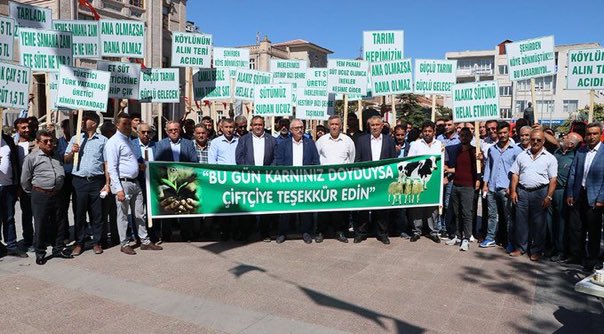Farmers across Turkey are increasingly staging protests in response to rising production costs and stagnant or falling prices for their crops, BBC’s Turkish service reported on Wednesday.
With costs such as fuel, fertilizer and pesticides climbing, farmers say the prices they receive for their produce are no longer sufficient to cover their expenses, pushing many to the brink of financial ruin.
According to the Turkish Statistical Institute (TurkStat), agricultural input prices rose by 47.56 percent in June compared to the previous year. Meanwhile, the price of key crops like sunflower, corn, wheat, barley and various fruits and vegetables have remained stagnant, with some, such as tomatoes, even dropping below last year’s levels.
This growing disparity between production costs and market prices has triggered widespread protests.
In western Bursa province, tomato producers took to the streets after wholesalers began offering prices lower than those agreed upon in contracts.
🍅 Bursa’da bir çiftçi 30 ton domatesi kepçe ile yere serdi.
🚜 Çiftçi perişan! Aynı domates pazarda da markette de ateş pahası.
💡 Her şey çöküyor. Tarım Bakanı İbrahim Yumaklı nerede? pic.twitter.com/Qn6HZOFcxk
— Turhan Bozkurt (@TurhanBozkurTV) August 21, 2024
Similar protests have erupted in other regions, including the western provinces of Balıkesir, Bilecik and İzmir and the central Anatolian province of Aksaray, as well as Kahramanmaraş and Gaziantep in the southeast, where farmers have staged tractor convoys to express their dissatisfaction.
The situation has become so severe that some farmers have resorted to drastic measures to draw attention to their plight. In Bursa a farmer dumped 30 tons of tomatoes after failing to sell them at a profitable price.
In the central Anatolian province of Konya, a melon farmer protested by smashing his produce in front of the municipal building after being unable to sell his melons at a profit. In western Manisa province, three farmers, unable to secure a fair price for their melons, chose to give away approximately 600 tons of their produce rather than sell at a significant loss. Despite having invested heavily in their crops, the farmers were faced with offers that were far below their production costs, prompting them to distribute their harvest to locals rather than suffer further financial losses.
The situation for Turkish farmers has become increasingly dire, with many experiencing losses on nearly every crop they produce. Structural issues in the agricultural sector, such as the lack of effective production planning, have only exacerbated the problem. This year, almost all agricultural products are affected by pricing issues, a situation that experts warn is unprecedented.
The challenges are compounded by reduced consumer purchasing power and a weak tourism season, which have diminished demand for agricultural products, leaving many unsold in the fields.
Turkey’s food inflation is the highest among Organisation for Economic Co-operation and Development (OECD) countries, with a year-on-year increase of 68 percent in June, according to the OECD. Despite these soaring prices, farmers see little of the benefit, as much of the price increase occurs further down the supply chain, with farmers bearing the brunt of rising costs.
The inability of farmers to pass on these costs means they often end up absorbing the financial impact, further deepening their struggles.
The protests are shedding light on long-standing issues in Turkey’s agricultural sector, including a lack of effective cooperatives and insufficient public support. The scale of the current protests suggests a growing recognition among farmers of the need for better organization to improve their bargaining power.
Farmers are feeling the effects of inflation as consumers as well, witnessing significant markups on the products they sell once they reach the market. There is a growing need for farmers to be able to sell their products at prices that adequately reflect inflation and production costs.
The Turkish government has sought to downplay the protests, suggesting that they are being politically motivated by opposition parties.
Opposition parties argue that the protests are a direct result of the financial hardships faced by farmers, who feel ignored by the government and unable to secure fair prices for their crops.
Experts warn that if these trends continue, Turkey’s agricultural sector could suffer long-term damage. Many farmers are contemplating abandoning production altogether, which could have devastating consequences for the country’s food supply and agricultural economy.
